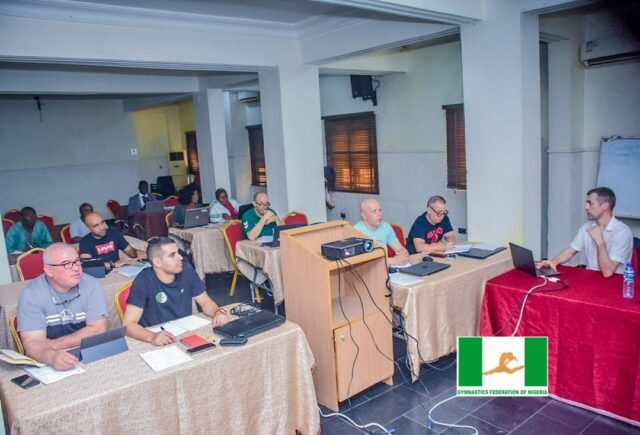Nigeria’s drive to transform itself into a global sports hub gathered fresh momentum this week as the National Sports Commission (NSC) welcomed officials from five countries to the 2025/2028 International Gymnastics Federation (FIG) Men’s Artistic Gymnastics (MAG) International Judges Course in Abuja.
Read Also: Just-In: Nigerian Para-Cyclists Make Golden Statement In Cairo With Four Medals
The intensive five-day programme, which runs from May 10-14, has drawn aspiring judges from Algeria, Egypt, Cameroon, South Africa and host nation Nigeria. Presiding over the sessions is respected FIG expert Dmitri Andreev of Russia, whose brief is to sharpen the continent’s cadre of MAG judges ahead of the next Olympic cycle.
“This course is yet another step in our mission to make Nigeria a preferred destination for international sporting activities,”
— Hon. Bukola Olopade, Director-General, National Sports Commission
Raising the bar
Under the leadership of NSC Chairman Mallam Shehu Dikko and Director-General Olopade, Nigeria has challenged every national federation to expand talent pipelines and deepen international relevance. The Gymnastics Federation, headed by Prince Kelvin Erhunmwunse, answered the call by securing hosting rights for the FIG course—Africa’s first since the pandemic.
Observers say the move could accelerate Nigeria’s ambition to field world-class judges at Paris 2028 and Los Angeles 2032, while positioning Abuja as the go-to venue for technical clinics on the continent.
A run of headline events
The Judges Course is only the latest in a string of high-profile meets the NSC has lured to Nigerian soil:
ECOWAS African Wrestling Championship (February 2025) — 11 nations converged on Yenagoa to mark ECOWAS’s 50th anniversary.
African Military Games “AMGA Abuja 2024” (December 2024) — 23 service teams competed in 16 disciplines across the capital.
Such events, combined with the recent election of Nigerian sports administrators to global boards—Francis Orbih (Badminton), Daniel Igali (Wrestling) and Erhunmwunse (Gymnastics)—have burnished the country’s reputation for both organisational clout and diplomatic reach.
Looking ahead
With three days of coursework still to run, participants will undergo written and practical assessments that qualify successful candidates to officiate at continental and world championships through 2028. The NSC says more international certifications—in coaching, sports medicine and event management—are in the pipeline for the coming year.
“The expertise we grow here does not stop at gymnastics,” Olopade noted. “It feeds into every sport and every young athlete who dreams of standing on a podium with the Nigerian flag.”
As whistles echo through Abuja’s Moshood Abiola National Stadium this week, the message is clear: Nigeria is not merely hosting events; it is building the backbone of African sport—one training course at a time.









